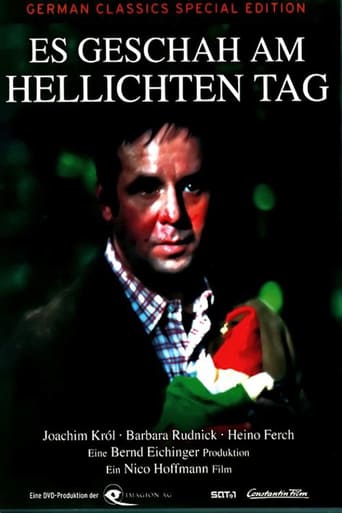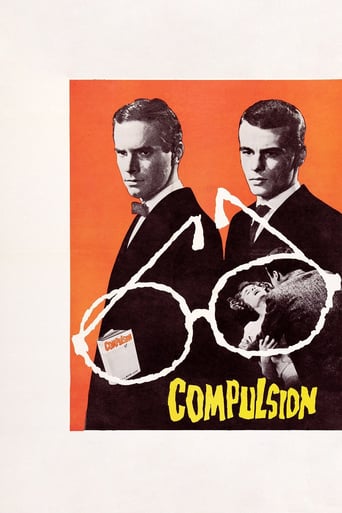


Compulsion
Two close friends kidnap and murder a young boy and are defended in court by a renowned attorney who makes an impassioned plea against capital punishment.
-
- Cast:
- Orson Welles , Diane Varsi , Dean Stockwell , Bradford Dillman , E.G. Marshall , Martin Milner , Richard Anderson


Similar titles
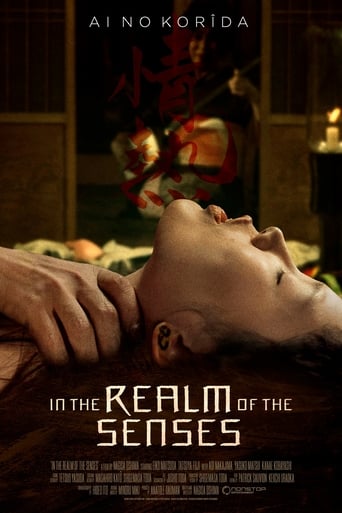
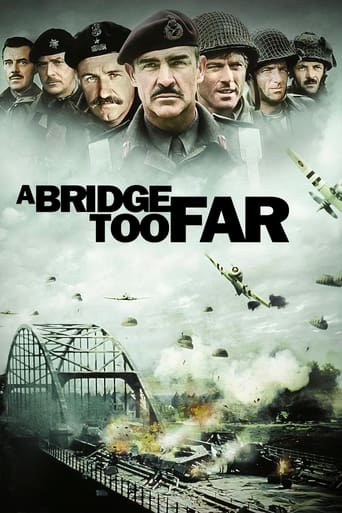

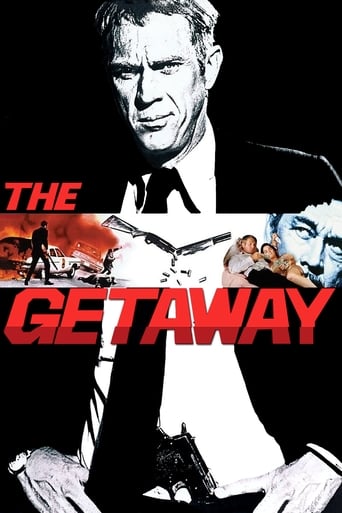
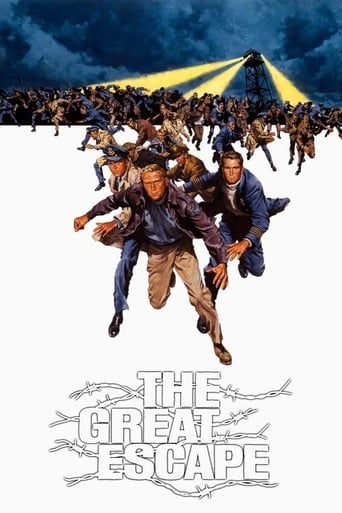
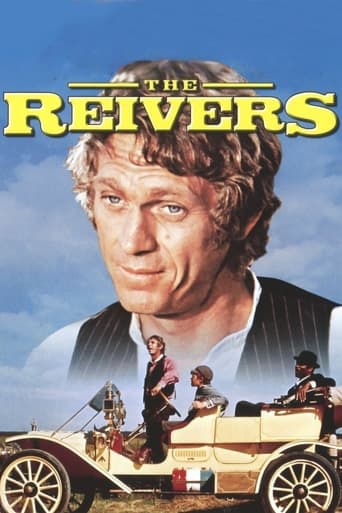
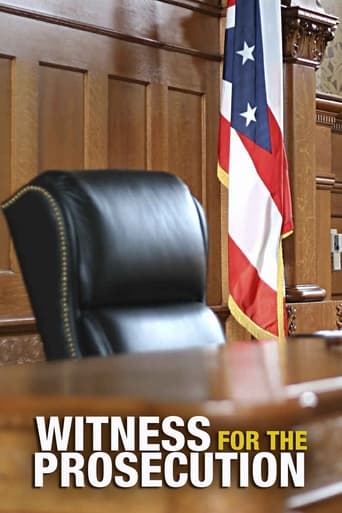
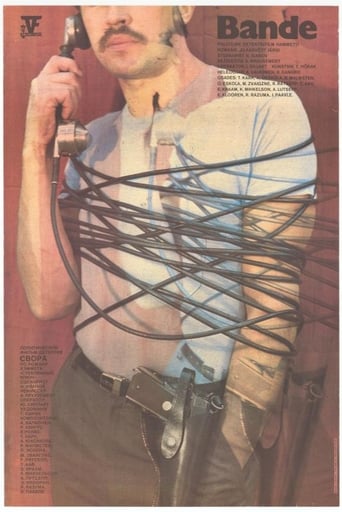
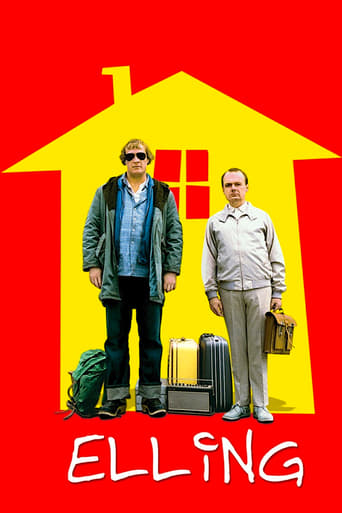
Reviews
The Worst Film Ever
Bad Acting and worse Bad Screenplay
As somebody who had not heard any of this before, it became a curious phenomenon to sit and watch a film and slowly have the realities begin to click into place.
Excellent and certainly provocative... If nothing else, the film is a real conversation starter.
Deserved the acting awards for the three male actors that the Cannes festival bestowed. Orson Welles is amazing while delivering his lines--almost whispering and yet being heard. His performance makes Marlon Brando's famous roles look artificial and contrived. I liked the visual play of the director with the spectacles several times in the film, each time in a different manner. Director Fleischer who impressed me with his film "Barabbas" continues to impress me here. Probably, in this film it was the final line of theism versus atheism. Finally. this is an important example of a film that argues against the death penalty.
Compulsion is directed by Richard Fleischer and adapted to screenplay by Richard Murphy from the novel written by Meyer Levin. It stars Dean Stockwell, Bradford Dillman, Orson Welles and Diane Varsi. Music is by Lionel Newman and cinematography by William C. Mellor.Based upon the real life Leopold and Loeb murder trial of the 1920s, Compulsion finds Artie Strauss (Dillman) and Judd Steiner (Stockwell) as two well to do young men attempting to commit the perfect crime - murder! But it wasn't so perfect after all and they soon find themselves on trial for their own lives. Enter famed attorney Jonathan Wilk (Welles), who fights to keep them from the death penalty.Healthily rated in some quarters, it's a film that actually does divide opinions, which when all is considered is unsurprising given the capital punishment core of the story. The story builds superbly, brilliantly photographed and paced by cinematographer and director, and performed with imposing skills by Dillman and Stockwell. Then the crux of the film arrives in the form of Welles, who late in the play has the unenviable job of turning the piece into a soapbox anti capital punishment advertisement. It's also a performance from Welles that has drawn major pros and cons in critical circles. Whatever your thoughts on capital punishment, Welles makes a telling acting mark. The sound mix could have been fine tuned, as Welles is prone to mumble during his speeches, but it remains gripping on court room drama terms, even if there's a little deflation - a feeling of anti-climax - after the build up had been so good. Not really capturing the notoriety of the real case, it's nonetheless a compelling piece and well worth seeking out. 7/10
As a result of his handling of this film, Director Richard Fleischer either inherited a reputation for his skill at telling stories about flawed murderous characters or he was attracted to the subject (The Boston Strangler" in '68 ~ "Ten Rillington Place" in '71) Whatever the driving forces he surely displayed a natural talent to examine, and chill, within the genre. What 'Compulsion' achieves is certainly compelling viewing.With its basis in shocking fact this movie works on several levels.Firstly: as a denouncement of certain teachings found within educational institutions on the writings of German post modernist philosopher Friedrich Nietzsche. In this instance by examining his theories that certain members of the human race are, by benefit of their advanced knowledge, and superior intellect, above the law of the 'common' people. He regarded these as the 'Superhumans'. Its even possible this philosophy and his 'will to power' could arguably be attributed to the actions of certain members of the ruling class, perhaps even forming part of the disastrous 'causes' of World War 1, etc (as a contributing force behind the philosophical reasonings of the day)The characters that form the homosexual duo of this shocking case are representational of the 'Crime of the Century' murderers: Leopold and Loeb. Both sentenced to Life + 99 years for the senseless killing of 14yr old Bobby Francis (2nd cousin of Loeb). Their reason for the murder? the thrill of performing the 'perfect' murder based on the repugnant belief of their own 'superior' Nietzscheian intellect! Secondly: as an argument against capital punishment. The parents of Loeb commissioned the services of renowned criminal attorney Clarence Darrow (Orson Wells) who was championing the case against the death penalty. His brilliant courtroom speech is regarded by some as one of the most important turning points in redemptive sentencing. This humanitarian reverse reasoning has proved beneficial in several cases, but how does it hold up within the framework of this modern era? Some contemporary viewers might bring into question the growing number of people who fall victims to murderous criminals - following their re-release into society as being 'CURED' - Sadly this number would appear to be larger each year. When this is considered, along with the rapidly growing number of serial murderers now held in 'corrective' services, it invites the question...if proved guilty beyond doubt, and never to be released, is this then worthy of the very large resources involved?. Difficult situation. The performance of Dean Stockwell (as the Leopold character) is quite astounding, as are all the superb players in this stark drama. Somewhere along the way it would seem some character details, either within the screenplay or the novel, have perhaps been transposed differently from the claims of the real participants and various reports ~ but this tends to occur with many transcriptions of factual events. Oscar winning veteran director of photography: William C. Mellor: earlier known for the good looking "Reaching for the Sun" '41 ~ "Bad Day at Black Rock" '55 ~ "Giant" '56, captures all the tension in striking B/W CinemaScope. Boston born screenplay writer Richard Murphy in the same year adapted Paul Muni's final movie: "The Last Angry Man" for the screen and is also known for, "Les Miserables" '54 ~ "Panic in the Streets" '50 ~ "Deep Waters" '48. His screenplay was based on the novel of the same name by Meyer Levin, writer and producer of "My Father's House" in '47. Director Fleischer a few years later would give us "Barabbas" '61 and "The New Centurions" '72. He begun in the early 40's working on fast paced RKO supports like the acclaimed "Narrow Margin" '52.My brother in law made me a present of a superbly re-mastered DVD, so for those interested in thought provoking stories based on factual crimes, this comes recommended. KenR
It's best to look at Compulsion in two halves: the first half starts off with Dean Stockwell and Bradford Dillman just coming off of their crime and the former holding his stolen typewriter (this isn't shown at all, so maybe, for just half a second, one might wonder if they're the killers... until they move their mouths and look at one another). In short, they kidnapped and killed a little kid, and they spend the first half - as preppy college kids in 1924 Chicago - trying to trace their tracks and not look guilty as hell (the latter part they fail at, miserably). The other half is the court case when they're brought up on their charges and facing the hangman's noose. But enter in Jonathan Wilk (Orson Welles), inspired by Clarence Darrow - as the case is the Leopold-Loeb inspired one - who is here as the Best Trial Lawyer In The Country (in caps) there to not say they don't deserve to be punished, but that they don't deserve to die so quickly.Many will remember this for the final courtroom monologue that Welles delivers. And no wonder, as it's reported often as one of the (if not THE) longest in cinematic history. What marks this as being so extraordinary and gripping is the basic humanity of his delivery. We get some of the dry wit that we may see in other Welles performances (i.e. Third Man), but here it's different as his character Wilk gives his impassioned plea.It's as if he can barely argue anymore, and he's just trying to talk to the people of the court - the judge especially, as due to reasons there's no jury for this case - and why Capital punishment shouldn't occur here, despite the heinous act. Watch how Welles goes about the courtroom, exerting his authority, but his delivery is carefully measured, almost saddened by the horrors of all humanity. It's the most humble we may have ever seen Welles on screen, and it's all the greater for it; you want to rewind it to see every nuance, every moment where that usual blustering, almost over-the-top (albeit towering and great) Welles is replaced by something... compassionate.It is such a great set piece, and the trial before it is sensational too, that you almost forget that the first half is just alright. Both Stockwell and Dillman are fine, with Stockwell kind of anticipating Norman Bates in a strange way (I have to wonder if Hitchcock watched this, not just as it is a retelling of the case of Rope, but for the aspect of a skinny, pathological guy into birds). These scenes are directed with competence, skill, even some sort of artistry with black and white scope, but it feels like we're waiting for the main show to happen. Perhaps Dillman is just so pushy, or maybe spot on, with his sociopathic killer that it gets almost tiring after a while.So, in other words: 1st half, 3 stars. Second half, 4 stars. Thus, this rating (or put into 10/10)

